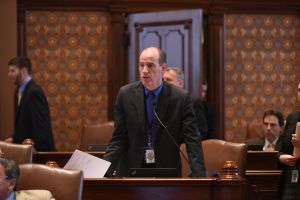- Details
- Category: Press Releases
 SPRINGFIELD—New safeguards for processing DNA evidence will be put in place to improve tracking of sexual assault offenders thanks to legislation, sponsored by Senator Bill Cunningham, being signed into law.
SPRINGFIELD—New safeguards for processing DNA evidence will be put in place to improve tracking of sexual assault offenders thanks to legislation, sponsored by Senator Bill Cunningham, being signed into law.
On Friday, the governor signed Senate Bill 2221, which would require the state police notify not only the local police department when a potential DNA match has been found, but they must also report the finding to the appropriate state’s attorney.
The new law comes in response to a situation that occurred in the Village of Robbins, when the local police department failed to follow through on a rape investigation after a state crime lab alerted them of a positive match on a DNA test kit. The suspect identified by the lab was never arrested and went on to commit additional crimes.
“This new law will enable prosecutors to follow up on lab reports and ensure that positive DNA matches are being investigated by local police departments," Cunningham said. "Victims of sexual assault must have confidence that law enforcement is doing everything possible to track down violent sexual predators."
The new law would also require that local police departments and the state police take annual inventories of DNA test kits in their possession and report that to the appropriate state’s attorney’s office.
The new law went into effect immediately. Cunningham thanked Cook County Sheriff Tom Dart for bringing the issue to light and for his department's work reinvestigating dozens of unsolved rape cases in Robbins.
- Details
- Category: Press Releases
 SPRINGFIELD— On Thursday, State Senator Bill Cunningham joined a bipartisan group of senators to pass legislation that would raise the investment the state makes in elementary and secondary education by more than $6 million for the southwest suburbs school districts he represents.
SPRINGFIELD— On Thursday, State Senator Bill Cunningham joined a bipartisan group of senators to pass legislation that would raise the investment the state makes in elementary and secondary education by more than $6 million for the southwest suburbs school districts he represents.
It would also send stopgap funding to institutions of higher education and human service providers throughout the 18th District.
“Illinois has very big problems, and we need bipartisan solutions. I am glad that we were able to come together and agree that investing in primary, secondary and higher education needs to be a top priority,” Cunningham said. “This is a start to ensuring that we can get Illinois back on the correct fiscal path.”
Senate Bill 2047 would provide a stopgap budget for the state for the first half of FY 2017.
The legislation also would ensure that state-funded road construction continues throughout the next year.
- Details
- Category: Press Releases
 SPRINGFIELD—The federal government’s Surface Transportation Board has ruled against CSX Transportation in a complaint brought by the Village of Evergreen Park and City of Chicago.
SPRINGFIELD—The federal government’s Surface Transportation Board has ruled against CSX Transportation in a complaint brought by the Village of Evergreen Park and City of Chicago.
The case involved multiple problems with CSX's mismanagement of a rail line that runs just East of Kedzie Avenue. Senator Bill Cunningham, who represents Evergreen Park and Chicago's 19th Ward, helped coordinate the case.
“We have been dealing with blocked crossings and idling trains since CSX acquired the Elsdon Line back in 2013,” Cunningham said. “This action by the STB will improve the quality of life for the residents of my district. I thank everyone who took a proactive step in holding CSX accountable.”
Complaints about CSX included multiple blocked grade crossings, trains idling in residential neighborhoods for hours on end, and malfunctioning gates that would stop traffic with no train in sight. Most troubling, stopped and slow moving CSX trains have blocked grade crossings on 95th Street, the main emergency route to Christ Advocate Medical Center, the regions only top level trauma center.
CSX now will have to file monthly reports with the STB detailing the company’s efforts to address malfunctioning gates and grade crossing blockages.
- Details
- Category: Press Releases
 SPRINGFIELD—Legislation passed by Senator Bill Cunningham will help local police keep guns out of the hands of people who've had orders of protection issued against them.
SPRINGFIELD—Legislation passed by Senator Bill Cunningham will help local police keep guns out of the hands of people who've had orders of protection issued against them.
House Bill 6331 would require the state police notify law enforcement agencies that have jurisdiction to assist in seizing a FOID card when the person’s FOID card has been revoked because they were the subject of an existing order of protection.
Currently, while a FOID card could be revoked for an existing order of protection, the state police were not required to provide notice to law enforcement agencies that would have jurisdiction due to an oversight in the law.
“This loophole could have huge ramifications in our criminal justice system. We need to push this through to ensure the state police and local law enforcement are able to have and share the necessary information to protect and serve their communities,” Cunningham said.
The legislation has passed both chambers and goes to the governor for approval.
More Articles …
Page 57 of 80


